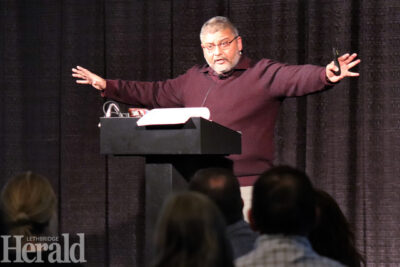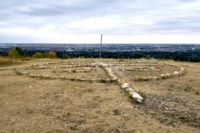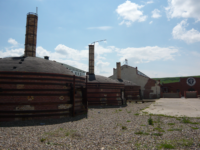University presentation explores the mysteries of the cosmos
By Alejandra Pulido-Guzman - Lethbridge Herald on December 7, 2022.
 Herald photo by Alejandra Pulido-Guzman
University of Lethbridge physics and astronomy professor Saurya Das, explains how the universe is expanding, during his Our Universe: its beginning, flow and end presentation as part of the PUBlic Professor Series.
Herald photo by Alejandra Pulido-Guzman
University of Lethbridge physics and astronomy professor Saurya Das, explains how the universe is expanding, during his Our Universe: its beginning, flow and end presentation as part of the PUBlic Professor Series.LETHBRIDGE HERALDapulido@lethbridgeherald.com
A recent installment of the PUBlic Professor Series saw University of Lethbridge physics and astronomy professor, Saurya Das speak about Our Universe: Its Beginning, Flow and End.
With close to a 100 people attending in person and another 100 tuned in online, Das explained what is known and what is unknown about the universe and presented some ideas addressing those unknowns.
He spoke about the universe being simple, quantum and very small about 14 billion years ago. He said it is expanding, accelerating and unfortunately we cannot see 95 percent of it. He also pointed out that it is unknown if there was in fact a Big Bang, or if we have an ever-lasting or cyclic universe.
In an interview with the Herald after his presentation, he said his main area of research is to answer the fundamental questions of the universe, about the contents of the universe and its evolution.Â
“What it is made up of, and where it started, where it is going and where it will end if it ends at all,” said Das.
He explained researching those questions in a universe where 95 per cent of it is unknown by employing the analogy of a closed box of food.
“It smells nice, but it’s closed so we don’t know what’s in there. Then we try to take a guess, I say there is Indian food in there, somebody might say there is Chinese food in there, so we have all these theories, but how do you know which one is true without opening the box?”
“Many people have many theories about the food but only one of them is right. We know that 95 per cent is out there, that is like the food in the box, we know is there because of the smell but on the other hand, we would like to know what’s in there,” said Das.
He said that is the same in the universe that we live in, we see that we have three space dimensions, one time dimension, we have so many electrons and we naturally try to ask the question about why it is the way it is.
Das said people ask questions like why do we have a universe that is expanding?
“We see it expanding but why? There must be more on the line. We could just say, well that’s the way it is and leave it at that, but human beings are never satisfied. They always want to go deeper and find a reason why that is happening,” said Das.
He said that is what drives him and many like him to the research, to try to understand the big questions about the universe but in a very concrete way, not just words.
“In terms of real mathematics, real calculations and predicting signatures of my theory which can be seen in the universe out there,” said Das.
His research group was one of the first to compute universal corrections to certain black hole observables and to show that quantum gravity effects should be present and potentially detectable in practically all quantum systems.
Das has published over 130 research articles in international journals and co-authored a book on symmetry, relativity and quantum mechanics. His research has been continuously funded by the Natural Sciences and Engineering Research Council of Canada and other sources.
Das said it is important to have this type of presentation because they are useful to inspire the next generation of physicist.
“We need fresh minds, eventually I will become very old and we need fresh minds to solve the big problems of the universe and this is one way of getting people interested,” said Das.
Follow @APulidoHerald on Twitter
20-19




